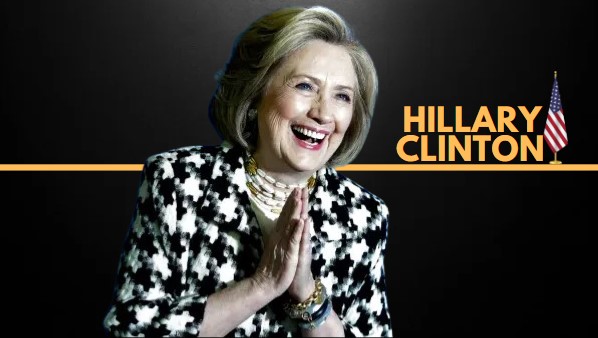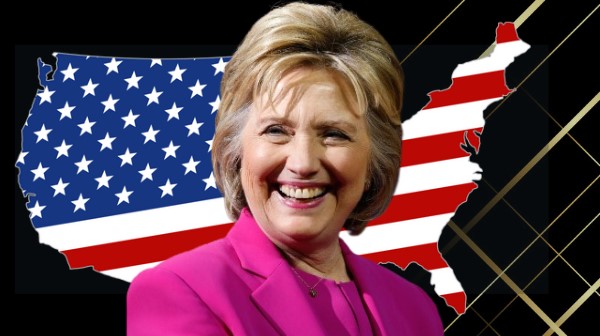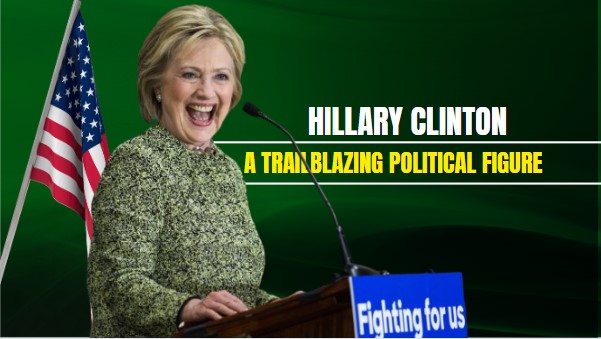
Hillary Clinton, a prominent figure in American politics, has had a long and influential career spanning decades. From her early life to her time as the Secretary of State and her pursuit of the presidency, Clinton’s journey is filled with accomplishments, controversies, and historical significance. This article delves into the life and career of Hillary Clinton, a woman who has left an indelible mark on the political landscape of the United States.
Early Life and Education
i. Birth and Family Background
Hillary Diane Rodham was born in Chicago, Illinois, on October 26, 1947. She was raised in a middle-class family with two younger brothers. Her father, Hugh Rodham, was a small business owner, while her mother, Dorothy Rodham, was a homemaker. The Rodham family instilled in Hillary the values of hard work, perseverance, and community service.
ii. Education and Early Influences
Hillary’s academic journey began at Wellesley College, where she became actively involved in student politics and graduated with honors in 1969. At Wellesley, she delivered a commencement speech that gained national attention, showcasing her intelligence and passion for societal issues. She later pursued a law degree at Yale Law School, where she met Bill Clinton, who would become her future husband.
Bio/Wiki of Hillary Clinton
| Name | Hillary Clinton |
| Birth Date | October 26, 1947 |
| Birthplace | Chicago, Illinois, United States |
| Education | – Wellesley College (B.A. in Political Science, 1969) |
| – Yale Law School (J.D., 1973) | |
| Occupation | – Lawyer |
| – First Lady of the United States (1993-2001) | |
| – United States Senator from New York (2001-2009) | |
| – 67th United States Secretary of State (2009-2013) | |
| Height | 5 feet 5 inches (1.65 meters) |
| Weight | Approximately 68 kg (150 lbs) |
| Eye Color | Blue |
| Political Party | Democratic Party |
| Spouse | Bill Clinton (m. 1975) |
| Children | Chelsea Clinton |
| Notable Achievements | – First woman to be nominated for President of the United States by a major political party (2016) |
| – Advocate for healthcare reform and children’s rights | |
| – Played a significant role in shaping U.S. foreign policy | |
| – Promoted women’s empowerment and gender equality | |
| Net Worth | Estimated at $45 million (as of my last knowledge update in September 2021) |
| Hobby | Reading, writing, and advocating for various social and political causes |
Political Career Beginnings
i.First Lady of Arkansas
After marrying Bill Clinton in 1975, Hillary Rodham Clinton embraced a role in Arkansas politics when her husband became the state’s governor in 1979. As the First Lady of Arkansas, she actively advocated for educational reform and healthcare initiatives, demonstrating her commitment to public service.
ii. First Lady of the United States
In 1993, Bill Clinton became the 42nd President of the United States, and Hillary Clinton became the First Lady. While in the White House, she played a significant role in shaping policy, particularly in healthcare reform. However, her efforts faced strong opposition, leading to the failure of the proposed healthcare plan.
Senate Years
i. Election and Key Initiatives
In 2000, Hillary Clinton made history by becoming the first First Lady elected to the United States Senate. Representing New York, she focused on issues such as healthcare, women’s rights, and the needs of the working class. Her work earned her respect from both sides of the aisle.
ii. Foreign Policy and National Security
Hillary Clinton served as the United States Secretary of State from 2009 to 2013 during the first term of President Barack Obama. She played a significant role in shaping foreign policy and national security matters during her tenure. Here are some key points about her approach to foreign policy and national security:
A. Promotion of Diplomacy: Clinton emphasized the importance of diplomacy as a primary tool for resolving conflicts and advancing U.S. interests. She sought to dialogue with friends and adversaries, believing that open communication was essential to finding common ground and fostering cooperation on various global issues.
B. Focus on Women’s Rights and Gender Equality: As a champion of women’s rights and gender equality, Clinton prioritized incorporating these issues into U.S. foreign policy. She argued that women’s empowerment was a matter of human rights and crucial for promoting stability, economic growth, and overall societal development.
C. Rebalancing towards Asia: Clinton advocated a strategic “pivot” or “rebalancing” towards Asia-Pacific. The aim was to strengthen diplomatic, economic, and security ties with countries in the area and counterbalance the rising influence of China.
D. Response to Arab Spring: During her tenure, Clinton was crucial in managing the U.S. response to the Arab Spring uprisings in the Middle East and North Africa. The U.S. sought to support democratic movements while addressing security concerns in the region.
E. Iran Nuclear Deal: Clinton was involved in the early negotiations leading up to the Joint Comprehensive Plan of Action (JCPOA), commonly known as the Iran Nuclear Deal. Although she initially supported diplomatic engagement with Iran, she later expressed some concerns about the deal, but ultimately the agreement was reached during her successor’s term.
F. Reset with Russia: At the beginning of her tenure, Clinton pursued a “reset” policy with Russia, seeking to improve relations between the two countries. However, the relationship became increasingly strained over issues like Russia’s actions in Ukraine and its interference in U.S. elections.
G. Counterterrorism and National Security: Clinton remained committed to counterterrorism efforts and ensuring national security. She supported the mission to eliminate Osama bin Laden and maintained a strong stance against terrorist organizations like al-Qaeda.
H. Internet Freedom and Cybersecurity: Clinton was a proponent of Internet freedom and advocated for using technology to promote democratic values while addressing the challenges of cybersecurity and protecting critical infrastructure from cyber threats.

2008 Presidential Campaign
i. Primaries and Campaign Strategies
In 2008, Hillary Clinton embarked on her historic bid to become the Democratic nominee for the presidency. Her campaign strategies and policy positions appealed to a broad base of supporters, particularly women and working-class Americans.
ii. Concession and Support for Barack Obama
Though Clinton came close to securing the nomination, she conceded to Barack Obama. Following her concession, she actively campaigned for Obama, demonstrating her commitment to party unity and her determination to elect a Democratic president.
Secretary of State
i. Appointment and Major Achievements
In 2009, President Obama appointed Hillary Clinton as his Secretary of State, making her one of the most influential figures in his administration. She played a crucial role in restoring America’s image abroad, championing human rights, and promoting diplomacy during her tenure.
ii. Controversies and Criticisms
As Secretary of State, Clinton faced controversies, most notably using a private email server for official communications. The investigation surrounding her email practices became a significant point of contention during her 2016 presidential campaign.
2016 Presidential Campaign
i.Candidacy Announcement and Campaign Platform
In 2016, Hillary Clinton announced her second presidential run, seeking to become the first female President of the United States. Her campaign platform centered on healthcare, immigration reform, and economic opportunity.
ii. Email Controversy and FBI Investigation
However, Clinton’s campaign was marred by the resurfacing of the email controversy from her time as Secretary of State. The FBI conducted an investigation, further fueling the debate surrounding her trustworthiness.
After the Election
i.Trump Administration and Political Activism
Following her defeat in the 2016 election, Clinton remained politically active, advocating for causes she had long championed, such as women’s rights and education reform. She also expressed strong opposition to the policies of the Trump administration.
ii. Role in the Democratic Party
Clinton’s influence within the Democratic Party remained substantial, and she continued to offer guidance and support to fellow Democrats running for office. Her endorsement carried weight in subsequent elections.
Legacy and Impact
i.Influence on Women in Politics
Hillary Clinton’s candidacy and political career have profoundly impacted women in politics. She shattered the glass ceiling, inspiring countless women to enter the political arena and pursue leadership roles.
ii. Policy Contributions and Criticisms
While Clinton received praise for her policy positions and advocacy, she faced criticism from opponents who disagreed with her stance. Her long career in the public eye meant that her decisions and actions were subject to intense scrutiny.
Conclusion
In conclusion, Hillary Clinton’s political journey is marked by resilience, dedication, and historic achievements. From her early years as an advocate for change to her role as Secretary of State and her pursuit of the presidency, she has made an enduring impact on the nation. While facing challenges and controversies, Clinton’s contributions to American politics cannot be denied.
FAQs
1. Was Hillary Clinton the first female presidential candidate?
No, she was not the first female presidential candidate. That distinction goes to Victoria Woodhull, who ran for president in 1872.
2. What role did Hillary Clinton play as Secretary of State?
As Secretary of State, Clinton played a crucial role in representing the United States on the global stage, engaging in diplomacy, and advancing American foreign policy interests.
3. How did the email controversy affect her 2016 campaign?
The email controversy significantly impacted her 2016 campaign, as opponents used it to question her trustworthiness and judgment.
4. What is Hillary Clinton doing now?
As of the time of writing, Hillary Clinton remains active in political advocacy, supporting Democratic causes and candidates.
5. How has Hillary Clinton influenced future female politicians?
Hillary Clinton’s candidacy has inspired and paved the way for future female politicians, encouraging them to pursue leadership roles in government and politics.






